Promoting youth engagement in climate action
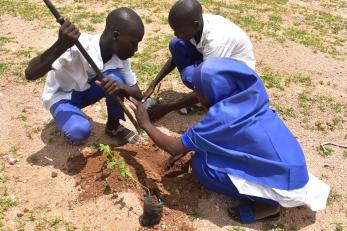
Linkage between climate change and the wider humanitarian crisis
Northeastern Nigeria, despite its promising economic and agricultural potential, is currently not enjoying economic boom like other parts of the country owing to the 12 years of ongoing conflict.
The degradation of land and its resulting impact on agricultural practices have further exacerbated the poor economic and social conditions in the region. Youth and women in degraded areas who directly depend on natural resources for subsistence farming, food security and income, with limited adaptation options, are especially vulnerable to land degradation and climate change.
Land degradation reduces farm yield and increases land management efforts, affecting women and youth disproportionately in some regions. Land degradation and climate change are threat multipliers for already precarious livelihoods, leaving communities more vulnerable to extreme climatic events and difficulty to overcome shocks. Low farm yield often leads to a lack of interest in farming, food insecurity, and in some cases, migration, conflict and loss of cultural heritage.
Engaging youth for climate action
In order to promote awareness around the impact of deforestation and climate change, and the role of the youth in promoting climate change action, the Feed the Future Nigeria Rural Resilience Activity commemorated the International Youth Day 2021 with events that engaged youth participants across four Northeast states in Nigeria.
The International Youth Day 2021 themed: “Transforming food systems: youth innovation for human and planetary health” provides an opportunity to highlight the need for the youth to be involved in global efforts that lead to healthy and sustainable options for individuals and the environment.
In partnership with the Ministries of Youth and Environment across Adamawa, Borno, Gombe and Yobe states, the Rural Resilience Activity commemorated the International Youth Day by facilitating the planting of over 7,000 economic and environmental preservation trees in targeted erosion prone areas and public spaces.
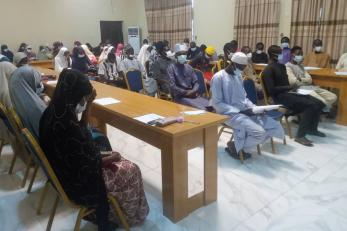
In Adamawa State, the commemoration kicked off on August 9, 2021, with a three-day training on “Climate change and conversion of waste to wealth.” Sixty youths were trained on how to convert plastic waste to interlocking bricks as well as how to convert sawdust to cooking coal and source of manure for crops. More than 100 youths also joined in the planting of 1,000 trees, forming a green belt in a community with a big market. The Ministry of Environment and community leaders in Mubi LGA, Adamawa State, flagged off the tree planting.
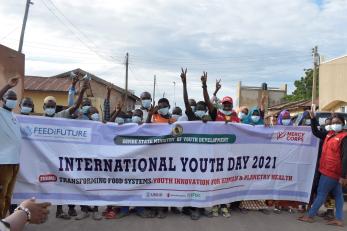
In Gombe State, the Commissioner for Youth and Sports, Abubakar Aminu Musa led an advocacy march to the Gombe State Government House. The Secretary to the State Government, Professor Abubakar Njodi, who spoke on behalf of Gombe State Government commiserated with the youth on the day and reiterated the government’s commitment to empowering youth for economic development. To ensure successful tree plantation, the State Ministry of Environment donated 5,500 seedlings to the tree planting initiative through the Ministry of Youth and Sports. Over 1,200 youths participated in the March and the tree planting. The marching exercise was led by a Gombe LGA chairperson, who led the tree planting exercise at the LGA Secretariat in Pantami.
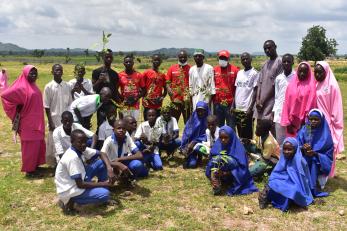
In Borno State, over 2,000 seedlings including economic trees such as gum arabic and mangoes were planted in strategic public places. In Kwaya Kusar LGA, 600 trees were planted at the LGA market while 400 seedlings were distributed to students for plantation in their schools. Each student named the tree after him/herself and are responsible for nurturing the trees.
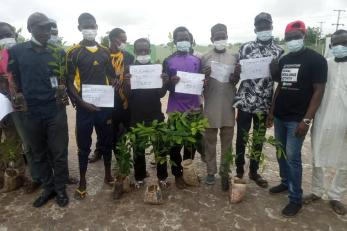
In Yobe State, a sensitization event on the importance of International Youth Day was held following which the Ministry of Environment demonstrated the correct ways of planting. The Rural Resilience Activity’s participants named the trees they planted after themselves. These participants are the Activity’s Greenbelt Ambassadors.
The International Youth Day events received a lot of applause from the communities, State Governments, producer groups and youth participants, most of whom are farmers who had no prior knowledge on how to protect the land from deforestation, which is a great resource in achieving food security.
About the Feed the Future Rural Resilience Activity
The Feed the Future Nigeria Rural Resilience Activity is a five-year Activity funded by United States Agency for International Development (USAID) as part of ‘Feed the Future, the U.S. Government’s global hunger, and food security initiative.’ The Activity is being implemented by Mercy Corps, with support from IFDC and Save the Children, across the states of Adamawa, Borno, Gombe, and Yobe in Northeast Nigeria; and has the goal of facilitating economic recovery and growth in vulnerable, conflict-affected areas. Through evidence-based interventions, the Activity will strengthen resilience capacities by using market-led approaches and sustainably move over 500,000 households out of chronic vulnerability and poverty.